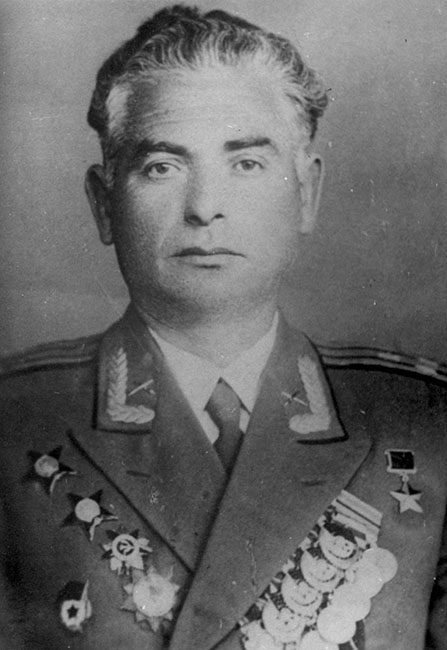Nokhem (Nikolai) Brozgol was born in 1912 in the village of Zatishie, Ukraine. After graduating from technical schools in Mariupol and Leningrad, Brozgol worked as foreman of a mechanical workshop at the Putilov factory in Leningrad. In 1932 Nokhem Brozgol joined the Red Army and became a member of the Communist Party. In 1936 he graduated from the Moscow Military Commanders' Training School and in 1940 completed an advanced commanding officers' course. At this time Brozgol changed his first name to Nikolai to conceal his Jewish origin. In 1939, following the Molotov-Ribbentrop Pact, Brozgol participated in the Soviet annexation of the Western Ukraine.
After war broke out on June 22, 1941, Nikolai Brozgol fought on the North-West, Voronezh, and Central Fronts. In June 1943 he was assigned to be commander of the Cannon-Artillery Brigade on the 1st Ukrainian Front, that participated in the battles for Kursk and Kharkov during the following months.
In October 1943, as Soviet troops were preparing to cross the Dnieper River near Pereiaslav-Khmelnitskii near Kiev, Nikolai Brozgol positioned his artillery weaponry on the left bank of the river, while he himself crossed over to the right bank, where the German troops were located. From there Brozgol personally directed the artillery operation, aiming fire by radio at the German positions. At the end of the month, after twice crossing the Desna and Dnieper Rivers not far from Kiev, the artillery brigade under Brozgol’s command disabled 18 "Tiger" and 16 other German tanks. On November 3, 1943, during the first day of the second battle for Kiev (the Kiev Strategic Offensive Operation) his brigade wiped out three enemy batteries and largely destroyed 5 companies of Wehrmacht infantry. On May 16, 1944 Nikolai Brozgol was awarded the title of Hero of the Soviet Union for his skill in leading his brigade across the Dnieper River and his display of courage in action. In May 1945 Brozgol was awarded the Order of Bogdan Chmielnitsky, 1st class. He ended the war in Czechoslovakia.
After the war Nikolai Brozgol continued to serve in the military, graduating from the High Officer Artillery School in 1947. In 1956 he was discharged from military service and settled in Leningrad. Nikolai Brozgol died in 1974 in Leningrad.
In 1982 a memorial plaque was dedicated to him in his native village of Zatishne.
Article about Nokhem Brozgol
An excerpt from the article “Hero of the Soviet Union Colonel Brozgol” by Mira Zheleznova (Aizenshtadt), prepared for the Jewish Anti-Fascist Committee, recounted Nikolai Brozgol’s main act of heroism during the Red Army military campaign for the liberation of Kiev in November 1943:
“…at the end of October 1943 the [second] battle of Kiev began. Colonel Brozgol was assigned to carry out a very important mission … he crossed the Dnieper River twice [capturing bridgeheads]: south and north [of Kiev]. Brozgol acted valiantly and boldly. He ordered heavy artillery to be set on the left bank of the Dnieper while, equipped with a radio, he crossed over to its right bank. After he covertly took up a position on enemy controlled territory, using a radio Brozgol directed [his unit’s] artillery fire toward the heart of the enemy defense that he had discovered. He aimed the fire with precession and, following the order of their commander, the artillery men liquidated the enemy’s defensive positions by their massive fire. On November 3, 1943 Colonel Brozgol led his troops in the battle for Kiev. …. For these acts of bravery Colonel Brozgol was awarded the title of Hero of the Soviet Union.”
From: GARF 8114-1-95, copy YVA JM/26112.







